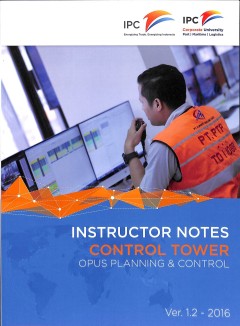Ditapis dengan

INSCRUCTOR NOTES CONTROL TOWER OPUS PLANNING DAN CONTROL
- Edisi
- -
- ISBN/ISSN
- -
- Deskripsi Fisik
- 121 halaman
- Judul Seri
- -
- No. Panggil
- IPC REP 2016 CON c C.1
- Edisi
- -
- ISBN/ISSN
- -
- Deskripsi Fisik
- 121 halaman
- Judul Seri
- -
- No. Panggil
- IPC REP 2016 CON c C.1

Problems in the onward and upward phase of APS system implementation
Studies conducted on advanced planning and scheduling (APS) systems have found problems in the marginal or negative returns from APS systems when they are implemented inmmanufacturing planning and control processes. The purpose of this study is to examine what problems exist in the onward and upward phase of the APS system implementation and how the individual, technical and organizational (ITO…
- Edisi
- -
- ISBN/ISSN
- -
- Deskripsi Fisik
- 23 p.
- Judul Seri
- -
- No. Panggil
- ATC LO IVE p

Adaptation of logistic operating curves to one-piece flow processes
To provide a model for precise logistic controlling of one-piece flow processes and for the description of the interactions between logistic performance measures. The developed method can help manufacturing enterprises to control their production processes and therewith to exploit existing rationalization potentials in their production.
- Edisi
- Vol. 55 Iss 3/4 pp. 284 - 299
- ISBN/ISSN
- 1741-0401
- Deskripsi Fisik
- 18 p.
- Judul Seri
- International Journal of Productivity and Performance Management
- No. Panggil
- ATC LO NYH a

Collaborative forecasting and planning in supply chains: The impact on perfor…
The purpose of this paper is to empirically examine the impact of internal and external collaborative forecasting and planning on logistics and production performance.
- Edisi
- Vol. 39 No. 2, 2009 pp. 84-105
- ISBN/ISSN
- -
- Deskripsi Fisik
- 25 p.
- Judul Seri
- International Journal of Physical Distribution & Logistics Management
- No. Panggil
- ATC LO NAK c

JIT systems and external logistics suppliers
Just‐in‐time (JIT) systems have evolved from a few selected implementations in the automobile industry into a widespread business practice. Early understanding of JIT models indicated that JIT can reduce inventory in the production system through the elimination of wasteful activities. This understanding led some researchers to suggest that JIT warehousing or JIT logistics are contradiction…
- Edisi
- Vol. 14 Issue: 6, pp.60-74
- ISBN/ISSN
- -
- Deskripsi Fisik
- 17 p.
- Judul Seri
- International Journal of Operations & Production Management
- No. Panggil
- ATC LO DAU j

Integration of economic production quantity in optimization design of control…
The purpose of this paper is to develop an extensive economic production quantity (EPQ) model on the basis of previous research. Considering an imperfect three-state production process, this paper makes contributions to an integrated model combining conceptions of quality loss and design of control chart based on EPQ model. The objective is to minimize the total production cost with the determi…
- Edisi
- Vol. 22 No. 7, 2011 pp. 929-946
- ISBN/ISSN
- -
- Deskripsi Fisik
- 20 p.
- Judul Seri
- Journal of Manufacturing Technology Management
- No. Panggil
- ATC LO SHU i

Competitive strategies and manufacturing logistics: An empirical study of Hon…
Sets out an exploratory study to give an alternative viewpoint of manufacturing logistics.
- Edisi
- Vol. 35 No. 1, 2005 pp. 20-43
- ISBN/ISSN
- -
- Deskripsi Fisik
- 27 p.
- Judul Seri
- International Journal of Physical Distribution & Logistics Management
- No. Panggil
- ATC LO CHA c

Can the SME survive the supply chain challenges?
The purpose of this paper is to focus on small and medium sized enterprises (SMEs) and the extent to which they are prepared to meet SCM challenges through the use of modern planning and control methods.
- Edisi
- Volume 12 · Number 1 · 2007 · 20–31
- ISBN/ISSN
- -
- Deskripsi Fisik
- 15 p.
- Judul Seri
- Supply Chain Management: An International Journal
- No. Panggil
- ATC LO HEI c

An agile planning and control framework for customer-order driven discrete pa…
In this paper, we present a planning and control framework for manufacture-to-order environments that enables and supports agile-based discrete parts manufacturing. The characteristic elements of our framework are that it is decentralized, logistics and business oriented, and that it recognizes that more detailed and more reliable data become available as orders advance through the different ma…
- Edisi
- Vol. 2 Iss 1 pp. 16 - 23
- ISBN/ISSN
- -
- Deskripsi Fisik
- 10 p.
- Judul Seri
- International Journal of Agile Management Systems
- No. Panggil
- ATC LO HAN a

Assessing information quality in manufacturing planning and control processes
The purpose of this paper is to define dimensions for describing information quality deficiencies and to describe forecast and customer order information quality deficiencies on various manufacturing planning and control levels.
- Edisi
- Vol. 26 No. 4, 2009
- ISBN/ISSN
- -
- Deskripsi Fisik
- 18 p.
- Judul Seri
- International Journal of Quality & Reliability Management
- No. Panggil
- ATC LO WAN a

The impact of engineering changes on materials planning
The purpose of this paper is to increase the understanding of the impact of engineering changes on the materials planning process.
- Edisi
- Vol. 17 No. 5, 2006
- ISBN/ISSN
- -
- Deskripsi Fisik
- 26 p.
- Judul Seri
- Journal of Manufacturing Technology Management
- No. Panggil
- ATC LO JON t
 Karya Umum
Karya Umum  Filsafat
Filsafat  Agama
Agama  Ilmu-ilmu Sosial
Ilmu-ilmu Sosial  Bahasa
Bahasa  Ilmu-ilmu Murni
Ilmu-ilmu Murni  Ilmu-ilmu Terapan
Ilmu-ilmu Terapan  Kesenian, Hiburan, dan Olahraga
Kesenian, Hiburan, dan Olahraga  Kesusastraan
Kesusastraan  Geografi dan Sejarah
Geografi dan Sejarah